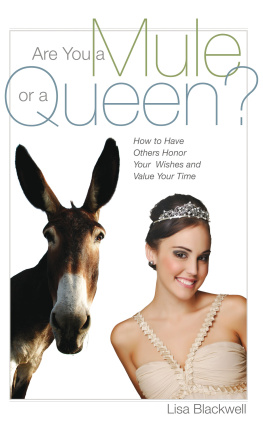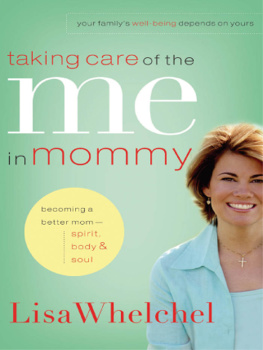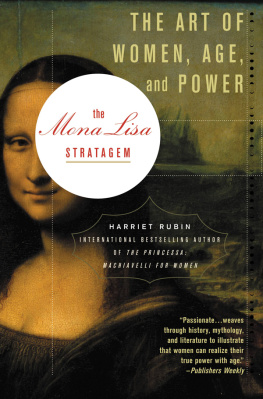Are You A Mule Or A Queen?
How to Have Others Honor Your Wishes and Value Your Time
by Lisa Blackwell
Copyright 2011 by Lisa Blackwell
Langdon Street Press
212 3 Ave North, Suite 290
Minneapolis, MN 55401
612.455.2293
All rights reserved. No part of this publication may be reproduced, stored in a retrieval system, or transmitted, in any form or by any means, electronic, mechanical, photocopying, recording, or otherwise, without the written prior permission of the author.
ISBN: 978-1-936782-18-5
Acknowledgements
I would like to thank my two writing buddies, Karen S. Williams and Harriet Washington, for encouraging me to keep writing when the times got lonely or frustrating. I would like to thank my father for always being supportive in my pursuit of various career paths. Many thanks to Dr. A. Walker for engaging in stimulating conversation that produced a lot of vibrant ideas. Most of all, thank God for giving me the hope and the courage to write on a subject that may help women get the equable treatment and respect they deserve.
Introduction
Do you ever feel like you're getting the life sucked out of you by friends, family, or coworkers who supposedly "care"? If you do, you're not alone. Though they may not speak about it, many women feel this way. Most women, in fact, have a natural instinct to nurture, but this characteristic sometimes gets them into trouble. Historically, we have often ended up divorced, with empty nests, underpaid, fatigued, lonely, and depressed. Ultimately, who has to take responsibility when we end up in a place we don't want to be? We do.
For many years during my career, I was an executive coach and process specialist. Part of my charter was advising people how to work more efficiently with very little time and resources available. Often, when I started working with them on efficiency, they would open up about being overburdened by personal commitments other than work. Commonly, one of the reasons these people were pressed for time was that, outside of work, others monopolized their time and energy without considering the individual's schedule and needs.
Most of the folks I coached wanted someone to listen to them and consider their needs. I also noticed that women generally seemed more pressed for time than men. Women had so many obligations outside of work children, parents, girlfriends, church, charities, and so onthat many of them seemed burnt out and joyless. I met many older women who described dark lives that were full of burdens and duties. For them the only sunshine was the innocence and hope their children showed. Even in the twenty-first century, with all the technology, education, and open dialogue on popular talk shows, there are still many women whose friends or family are not treating them considerately or compassionately. These women belong to all economic classes and educational groups. I know exactly how they feel because, secretly, I was also one of them.
I was raised to get an education and a good job, but self-care is something I had to learn on my own and through teaching others who, by society's standards, were successful. Many of these people, though prosperous in their careers, also had issues related to caring for themselves both inside and outside of work.
When I realized other people were in the driver's seat, controlling my spare time and creative energy, I knew I had to make a change. I felt my life was being wasted satisfying the emotional and intellectual needs of others. I felt cheated, since people were taking my time and ideas but very few were reciprocating. I decided to apply some of my process expertise to gathering data and analyzing why so many women, including me, seemed so overburdened.
In this book, I examine openly and nonjudgmentally many taboo situations in which women allow themselves to be exploited. I also consider issues ranging from family demands and inconsiderate, selfish friendships to parasitic husbands and boyfriends to establish the root causes and provide action-oriented solutions.
This book is meant to be a resource for those of you who seek ways to prevent people from casually mistreating you. The focus is on moving forward and growing, rather than clinging to a past spent struggling for respect. It will give you strategies for taking care of yourself and protecting your time.
My passion about this topic comes from having met many women with a poor quality of life, as well as my personal experience of reclaiming my life and time from those who assumed my life was at their disposal. My desire is to bring out of the shadows any behaviors that may not be serving you well so you can free up your time and energy and invest it in your own dreams.
Chapter 1:
Mules and Queens
A mule has neither pride of ancestry nor hope of posterity.
Robert Green Ingersoll
Have you ever wondered why some women become overburdened and exploited, while others are treated like royalty? Have you noticed that some women look happy and composed, while others look overweight and tired, as if they might keel over from a heart attack any second? Do you spend a lot of time listening to your family and friends tell drama-filled stories, when you'd rather be sleeping? Do people ask you to do a lot of things you don't want to do? Are people oblivious of how you feel when they talk to you? Do people treat you with honor and respect, or do they act as if your sole purpose in life is to validate them and make their lives easier? The pivotal question here is: are you treated like a mule or a queen?
Contrary to popular belief, there are mules and queens across all educational and social classes. There are incredibly wealthy "mules" in high society whose time and money are used up by friends and loved ones. Similarly, there are women who are queens in lower levels of society who subsist on meager incomes but whose families and friends love, cherish, and protect them. For the purposes of this book, the classification is based on how you are treated, as opposed to the material wealth you possess.
What are the characteristics of a mule? Wikipedia gives the following definition:
Operators of working animals generally find mules preferable to horses: mules show less impatience under the pressure of heavy weights, and their skin, harder and less sensitive than that of horses, renders them more capable of resisting sun and rain.
Does this animal sound as if it has much fun in life? Are you similar to the mule because you are constantly being pressurized to take on the heavy burdens of others? Women who have become mules have tougher skin. They have endured more. Many have seen their mothers treated harshly and have come to expect nothing better.
The Webster Online definition of a "queen" is as follows:
a. A woman eminent in rank, power, or attractions queen>
b. A goddess or a thing personified as female and having supremacy in a specified realm
c. An attractive girl or woman; especially, a beauty contest winner
I conducted a short survey of thirty-five women between the ages of thirty and ninety-four, including both professionals and stay-at-home wives. I asked them one simple question: Other than receiving material gifts, what treatment or behavior makes you feel cared for like a queen?
Their individual responses were categorized as follows:
Thoughtful acts from others: 15 responses
Being recognized: 5 responses
Others calling and checking in on them: 4 responses
Making them feel secure: 4 responses
Being listened to: 4 responses
Being surprised: 3 responses
The following are some of the actual responses to the question "What treatment makes you feel cared for or like a queen?"











